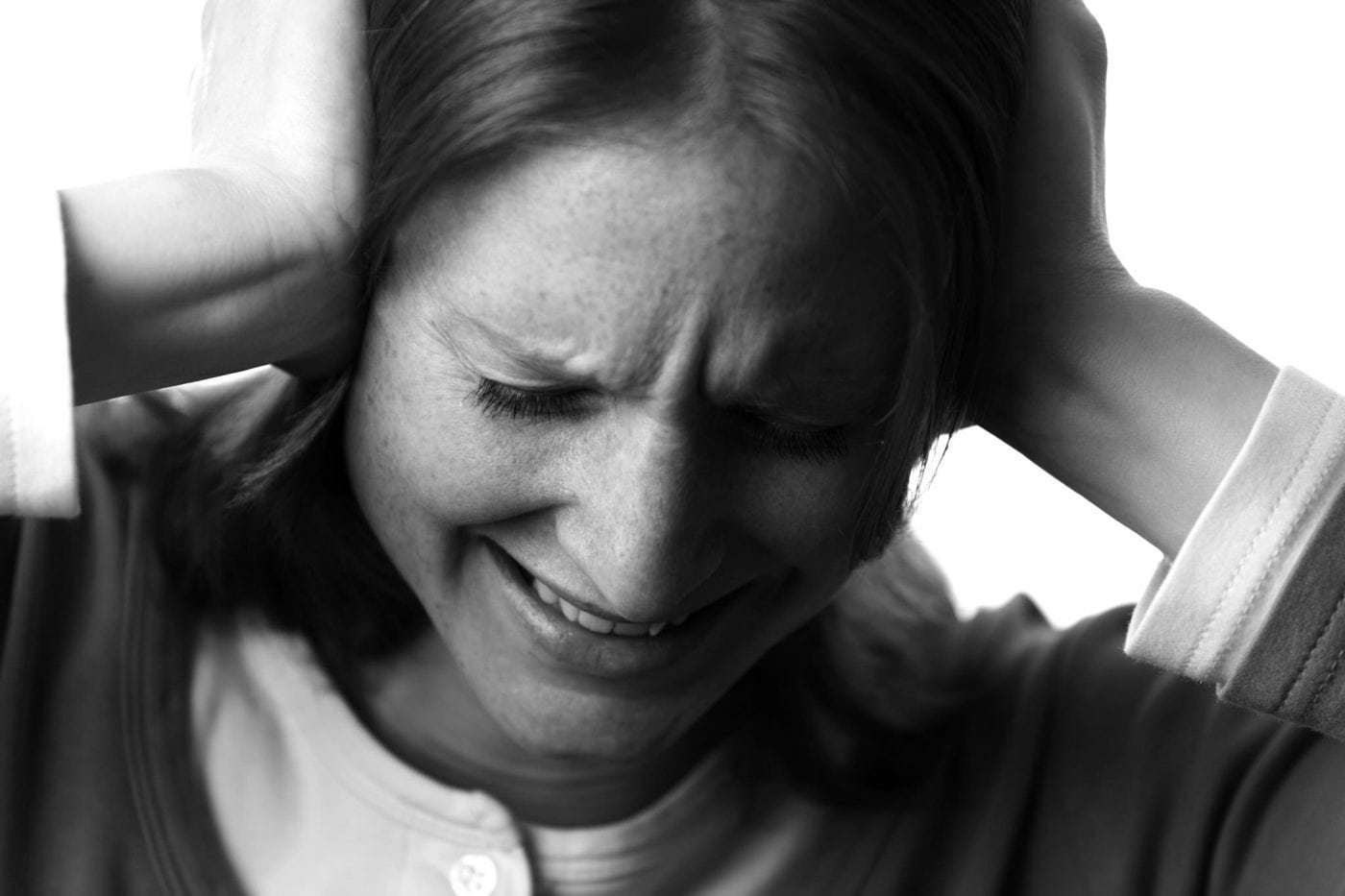When I Hear a Certain Noise I Feel Funny
Do you have difficulty tolerating everyday sounds? Accept you lot ever heard of hyperacusis?
Hyperacusis is characterized by decreased sound tolerance – an increased sensitivity to normal ecology sounds. This tin have a significant impact on many aspects of a person's life. It tin can disrupt a person's career, dismantle their social life, and possibly even rattle their peace of heed. Very normal activities like talking to a friend, watching Tv, driving a car, or vacuuming your habitation may feel difficult, uncomfortable, or perhaps even impossible. Some people even discover the sound of their own voice or their spouse'south voice intolerably loud.
How astringent is your hyperacusis?
If you live with hyperacusis, you may feel like the whole world'due south volume is unbearably and painfully high. High-pitched noises like alarms, babies crying, and drinking glass breaking can crusade pain and anxiety. You may experience concrete pain in your ear or a feeling of fullness (force per unit area) that is especially irritating. In addition, many people find that tinnitus (ringing in the ears) accompanies their sensitivity to sound, and some too lose their dynamic range of hearing (the ability to deal with sudden changes in volume).
Acquire well-nigh Misophonia which literally translates to "hatred of sound".
Hyperacusis is rare, occurring in an estimated ane out of fifty,000 people, only is increasing in occurrence due to loud noise exposure. Some people find it a minor annoyance, while others struggle to live a healthy and happy life with hyperacusis. If you believe yous suffer from the condition, contact Sound Relief for diagnosis and treatment.

Types of Hyperacusis
There are two types of hyperacusis: cochlear and vestibular. Cochlear, the near common form, causes hurting in the ear, frustration, and a full general feeling of intolerance to everyday sounds. Vestibular hyperacusis, on the other hand, causes feelings of nausea, dizziness, and imbalance when particular sounds are present. Both types of hyperacusis can cause anxiety, stress, depression, social isolation, and phonophobia (fright of normal sounds).
Practise non confuse hyperacusis with recruitment, a condition that causes an exaggeration in one's perception of sounds located in their frequency range of hearing loss. Where recruitment makes certain loud noises uncomfortably loud, hyperacusis makes all sounds too loud. A loudness discomfort test by an audiologist specializing in these conditions tin can assist make up one's mind which type of sensitivity you may be experiencing.
Causes of Hyperacusis
Hyperacusis affects people of all ages, and information technology tin influence your hearing in one or both ears. Typically, people are non born with this rare condition. It can develop over a period of fourth dimension or emerge quite suddenly. Causes of hyperacusis include, but are non limited to, the post-obit:
- Exposure to loud racket (causing damage to the cochlea)
- Head injury
- Lyme affliction
- Bell's palsy
- Tay-Sachs illness
- Williams syndrome
- Posttraumatic stress disorder (PTSD)
- Systemic lupus erythematosus (SLE)
- Viral infections that impact the inner ear or facial nerve
- Ear damage due to toxins or medication
- Temporomandibular joint (TMJ) disorder
- Airbag deployment
- Migraines
- Ménière's illness
- Multiple Sclerosis
Sometimes children with autism or cerebral palsy also suffer from hyperacusis, and information technology tin can occur in children with brain injuries.
Although experts do not know exactly why hyperacusis occurs, theories include a malfunction of the ear'due south protective hearing mechanisms, damage to a portion of the auditory nerve, a problem with the primal processing system, or a malfunction of the auditory nerve.
Treatment Options
Although a cure to chop-chop eliminate hyperacusis does not currently exist, therapies can improve the sufferer'south quality of life past reducing their fear and anxieties, helping them cope with uncomfortable sounds, and even reducing their sensitivity to sounds. For example, sound therapy tin can retrain the brain'south auditory processing center to accept everyday sounds as normal again. The individual wears a sound-generator that produces soft, soothing sounds that can exist controlled by the patient. Over the form of about 6 to 12 months, regular utilise of the device and directive counseling on advisable levels of sound and responses to them can rebuild the individual's tolerance to sounds. Sound therapy requires directive counseling past a qualified audiologist in lodge for information technology to be constructive.
Schedule An Date
People with a sensitivity to sound may wear ear protection in loud environments to conceal sounds. For example, they may choose to vesture earplugs or industrial earmuffs (or both). Yet, avoiding sounds can actually make someone more than sensitive to audio. Thus, audiologists typically advise confronting these tools unless it is universally necessary, such as at a concert or while using power tools.
If another medical condition causes hyperacusis, that condition will be treated alongside the hyperacusis.
Finally, many people suffering from hyperacusis can benefit from handling involving counseling. Through counseling, people living with hyperacusis can accost their fears and anxieties and alter their thought patterns around offensive sounds. This is especially beneficial for those who find themselves withdrawing from social engagements, avoiding professional person activities, and isolating themselves. Counseling may include cognitive-behavioral therapy (CBT), which helps people recognize useful and detrimental aspects of their daily lives in relation to hyperacusis. With the help of a therapist, the individual can modify their pattern of thinking or behavior to reduce the impact of sound sensitivity on their life.
Diagnosis
If y'all endure from hyperacusis, contact Sound Relief Hearing Heart today. Our good audiologists can help you identify the best options for treatment. To learn more about us, delight browse our website, visit our YouTube channel, or give us a call at 720-344-7600. Yous can also schedule an appointment online to meet with one of our audiologists. We look forward to hearing from you!
Source: https://www.soundrelief.com/hyperacusis/
